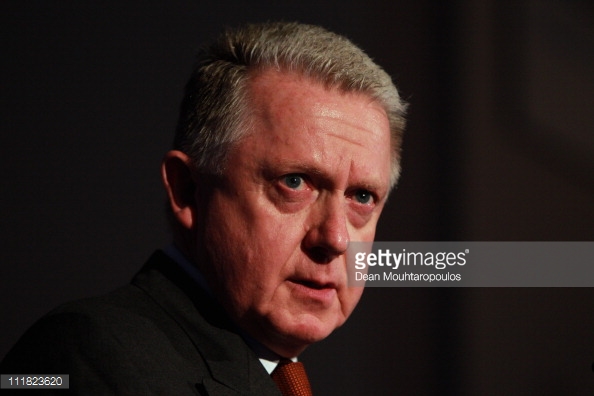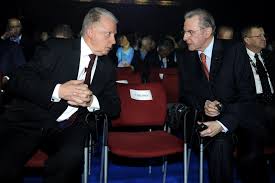Jacques Rogge served as president of the International Olympic Committee for 12 years, from 2001 until 2013. A key insider during the Rogge years — if not the supremely key insider — was the then-cycling federation president, Hein Verbruggen of Holland.
Verbruggen himself became an IOC member in 1996. In 2001, he led the IOC “evaluation” team for the 2008 Games; the members would select Beijing. Thereafter, Rogge appointed Verbruggen to head what the IOC calls its “coordination” commission — the link between local organizers and the IOC.
All this is to say that Verbruggen was, and is, an expert in the IOC, its culture, its ways and, in particular, Olympic bidding and organizing. He resigned his IOC membership at the end of the Beijing Games but remains an honorary member and a keenly influential voice in the movement. Now, in a new post to his blog, Verbruggen has given voice to the position increasingly resonating within even the most important Olympic circles:
The Olympic bid process is in crisis. That process is fundamentally, thoroughly broken. The IOC must start anew.
In his words: “… The current bidding system for cities vying to host the Olympic Games is totally outdated and must simply be torn up and discarded.”
In a telephone interview Tuesday, he said, referring to the current bid system, “That is 20, 30 years ago. That is over.” Referring to the current voting IOC members, he said, “If they don’t understand that, they have a problem.” He paused, then added, “They do have a problem.”
Though Verbruggen’s emphasis in the blog is on the future, and in particular the process yet to come for the 2026 Winter Games, he also makes in his column this central point, which is relevant to the ongoing process for the 2024 race, featuring Los Angeles and Paris. In the blog itself, these next sentences are all one paragraph. They are broken up here for ease of reading and emphasis:
“A fundamental condition of hosting,” he writes, “must be that a country can organize the Games without making taxpayers fund the investment for additional infrastructure.
“The only infrastructure investments that would be allowed would be those which would be made anyway, irrespective of hosting the Olympics.
“The only costs taken on by a host country’s government, therefore, would be those relating to security (which could be kept to a minimum by using the army, as happened at London 2012).”
Of the two 2024 bids, these words apply directly and forcefully to the privately funded Los Angeles candidacy. The LA bid calls for the construction of no new permanent venues.
The government-underwritten (that is, taxpayer-paid) Paris bid, by contrast, calls for Games-related construction of a new athletes’ village, aquatics complex and media housing, which are projected to cost at least $2 billion. History all but guarantees that would be low.
Government-funded (that is, taxpayer-paid) Games in recent years produced these sorts of outlandish figures: Sochi 2014, a reported $51 billion bill; Beijing 2008, $40 billion; Rio 2016, $20 billion (still awaiting final figures); London 2012 ($15 billion); and more.
Verbruggen is not — this must be acknowledged — a man who shies from battles. His tenure at UCI, the cycling federation, was marked by controversies over, among matters, Lance Armstrong. He and the longtime IOC member Dick Pound, who was also the first president of the World Anti-Doping Agency, have clashed, and repeatedly, over the years.
Thus the obvious question, and answer:
Will everyone agree with Verbruggen’s position about Olympic bidding? Hardly.
But:
Verbruggen’s position matters, and considerably, not just because he is willing to speak out — but because he understands what it means, as an influential and senior European voice in the movement, to post such comments.
Some if not most of the points that Verbruggen makes, it might be noted, echo observations advanced in this very space over the past few months if not years.
Of course they will be read and understood differently in many Olympic precincts because it is Verbruggen — different, of course, if one might be inclined to dismiss the work of a journalist on principle, and particularly an American, and all the more so one based in California. All good.
Here is the thing: Verbruggen is, as ever, willing to say the things that almost no one else on the inside is willing to say. And for publication.
The blog is actually the second of a two-part series. The first asserts, bluntly and accurately: “the IOC does not have a marketing strategy for its unique product, the Olympics.”
In that first column, Verbruggen also writes, among several memorable passages:
"IOC President Thomas Bach now says we need to change the bidding system because the current system has 'too many losers' (a sentiment that could equally be applied to all gold medalists at the Games). His remark is a bit of an oxymoron given that there are now only two candidate cities. It would be understandable (if the media speculation is correct) if the IOC allocated the 2024 and 2028 Games respectively to Paris and LA. But that would just be an ad hoc solution, born of necessity, and would offer no sustainable way out of the current crisis."
In that Tuesday phone interview, Verbruggen said, “I know very well how many times I told my [IOC] colleagues and also Jacques Rogge — the way that we force countries to organize the Olympic Games, with all the demands that we have, and the host-city contract with all the constraints! There are not more than 15 or 20 countries [in the world] that can do it. They didn’t want to believe me. They said, ‘Oh, we will always have countries.’ But now — the countries we want?”
A moment later, he said, “If you do not see these things happening, if you are not seeing a clear vision and you do not have a long-term strategy — now we are paying the price.”
In the mid-1990s, Verbruggen writes in the first of the two pieces, he served on the “evaluation” commission for the 2004 Games, ultimately won by Athens. In all, that panel visited 11 cities. After that, he chaired the 2008 commission.
“If the IOC had had even a basic long-term marketing plan,” he writes, “we would have realized 10-15 year ago how precarious the situation was becoming and we could have prepared against this eventuality. But, as I said, the IOC has a monopoly and is under no pressure to take these sorts of precautions. Having just signed a nice fat TV contract with NBC,” the most recent extending the network's rights from 2021 through 2032 for $7.65 billion, "it was too tempting for the IOC to just sit back and rest on its laurels. ‘What crisis?’ we would say, not realizing that, while we did indeed have a lucrative TV contract, we also had … no bidding cities.”
Five western European cities dropped out for 2022, leaving only Beijing and Almaty, Kazakhstan, Beijing winning. Five cities started for 2024; Hamburg, Rome and Budapest have dropped out, leaving only two, LA and Paris.
“Another factor in this crisis,” he says in the first blog, is the “extremely negative ‘reputation’ of the Olympic Games themselves, especially around its astronomic costs and poor legacy. Proactive PR is an essential part of any marketing strategy. For decades now, the Olympic Games have been tainted by extremely negative media reports about the massive investments required to host the event, all paid for with taxpayers’ dollars, not to mention reports of huge losses resulting from hosting the Olympics. (The latter are usually not true but are written to get attention.)”
An interjection: a Games operating budget typically is at or near black. But as Verbruggen points out, it’s the taxpayer-funded infrastructure investment associated with a Games that is the PR killer.
To resume where he left off:
“The IOC has stumbled from denial to denial — in other words, it has been reactive, not proactive — and now the damage is done. If we had had a proper long-term plan, we would also have had a strategy to combat this negative phenomenon. And if we had had a long-term plan, would we have voted so cheerfully to host the 2014 Winter Games in Sochi, where almost everything had to be built from scratch? Or would we instead have told the Russians: ‘Start building and we’ll come back in four years’ time and see how you are getting on?’ “
Verbruggen's proposal going forward:
Start with the basics. No more open bid system, in which any country that wants to can launch an Olympic bid. Instead, he writes, “the IOC should take the initiative itself” and reach out to “suitable” host cities or countries. That outreach would produce a shortlist.
Then the final selection should be made rationally, instead of — and this would a radical but welcome change — “the existing voting system by the 115 [IOC] members whose choices are often ‘colored’ by other (often political) motives.”
The system as it is now involves a secret ballot vote. It is well-known in IOC circles that, come voting time, promises are worthless and lies-to-your-face common because — with a secret ballot — accountability is zero.
To draw up that shortlist, Verbruggen writes, the IOC should approach two or three countries. Logically, it should go to preferred Country No. 1 and undertake negotiations. If no agreement, on to No. 2.
“To ensure success,” he says, “the IOC must also be prepared to make the host city contract much, much less onerous. I must say that I have never seen any other contract that is so skewed toward one party (the IOC), something that also makes it a product of a bygone age.”
He also says the new system “must allow scope” for a nation’s corporate entities to be “far more involved” in the delivery of a Games, “both commercially as well in the organization” of an Olympics.
The IOC, he writes, must “also assume greater responsibility for the organization of the Games,” adding, “Some tasks that are today blithely passed over to [local organizers] would be better organized by the IOC itself. That is logical: the IOC is deeply involved in every Games and so can make the best use of its accumulated know-how.”
As an example, he turns to 2026 and Switzerland, asking this reasonable question: how has it not played host to the Winter Games since 1948?
St. Moritz staged the Winter Games in 1928 and 1948. Twice in the past four years, voters in the canton that represents Davos/St. Moritz have voted no when asked if they wanted the Games, for 2022 and 2026.
Or, as Verbruggen notes obliquely, “Proposals for a Swiss Winter Games have been made time and again, but most of the time they have prompted a negative reaction from the Swiss population, mainly because of the perceived high costs.”
The Swiss town of Sion bid for the 2006 Winter Games, losing to Torino, Italy. Now it wants to bid for 2026.
“I would encourage the IOC to seize the initiative,” Verbruggen writes, to negotiate directly with Swiss officials, because a “spectacular and successful Winter Games in Switzerland in 2026 would be both a huge boost for winter sports as well as for the IOC.”
Hard to argue with that.
“Lastly,” Verbruggen writes, “I understand that my proposed new system would mean taking away from IOC members the privilege of choosing where to host the Games. But they surely understand that if nothing is done to resolve the current crisis then a time will soon come when they simply do not have any bids to choose from.”
Note the wording: “current crisis.”
No argument there, either.






